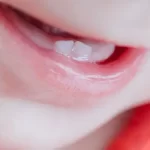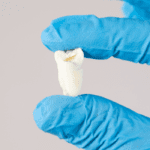The realistic appearance of false teeth allows you to smile naturally without worrying about what others might think.
Aside from filling in the gaps left by missing teeth, artificial teeth also offer other benefits. They also prevent facial muscles from sagging when you lose some of your teeth.
If you’re looking into dentures to improve your smile, Advanced Dental Group is here for you.
What Are False Teeth?
These are removable replacements for teeth made of metal, nylon, or acrylic that fit over the gums.
Artificial teeth eliminate problems that may result from teeth gaps. They improve your facial features and appearance and make it easier for you to eat, talk, and chew. Some options replace only a few missing teeth. Others replace all teeth, surrounding tissues, and gums.
Here are the different false teeth options available:
1. Complete Denture
Complete dentures have a complete set of porcelain or plastic teeth set in a plastic base, which mimics the color of gums.
The traditional full denture is secured in the mouth by sealing it with the gums.
You can also attach them to dental implants surgically placed in your jawbone. However, this treatment is more expensive than the traditional one.
2. Partial Denture
A partial denture can be made using a metal framework or a plastic base supporting artificial teeth. It is secured in the mouth with clasps and rests shaped to fit around natural teeth.
The traditional design for partial dentures uses a metal framework due to its rigidity and strength. Plastic partial dentures are usually used for emergencies or as temporary replacements for missing teeth to allow the gums and bones to heal before the dentist develops a more definitive solution.
3. Overdenture
Sometimes, your dentist can save some of your teeth to preserve your jawbone to provide support and stability for the denture they’re going to make. Dentists can make overdentures, which fit over your remaining natural teeth.
Who Is a Candidate for False Teeth?
Dentures are suitable for people with severe tooth loss. Having artificial teeth does not depend on your age but more so on the state of your teeth.
Artificial teeth need to be supported by natural tissue to stay in place, making it necessary for candidates to have healthy gum tissue and enough jawbone structure.
The majority of people with artificial teeth are 65 and over.
Stages of Getting Dentures: How Are They Made?
It takes several appointments and a few weeks to create a denture. Once your dentist (or prosthodontist) has discussed the types of dentures and cost and determined which type of appliance you need, this is how the process will go down:
1. Your dentist will begin by taking a series of impressions and measurements of your jaws and the space between them.
2. Next, they will make wax forms, patterns, and plastic models, which you will try on many times to ensure their fit. Before casting your dentures, your dentist will check their color, shape, and fit.
3. The dentist will cast the final denture.
4. Dentists will also make necessary adjustments after the dentures are cast.
4 Questions You Might Have About Artificial Teeth
Aside from types of dentures and cost, here are other questions you might have about artificial teeth:
1. Will eating with new dentures be difficult?
It may take some time to get used to eating with new dentures. You can start by eating small amounts of soft foods to help you adjust. Chew slowly, using both sides of your mouth.
Once you are comfortable with your artificial teeth, add more foods until you can return to your regular eating habits. Avoid hot, hard foods and sharp-edged shells or bones.
2. Will I look different with dentures?
This oral appliance is designed to look very similar to your natural teeth, so you should not notice any difference in your appearance. They can even enhance your smile.
3. Will artificial teeth change the way I speak?
You may experience difficulty pronouncing some words. Practice speaking the difficult words aloud if you have difficulty pronouncing them. You will soon become comfortable speaking with your new artificial teeth.
4. Do I need to wear it for 24 hours?
Your dentist will tell you when and how long to keep them in place. You might be asked to wear it in the first few days, even while sleeping.
This may be uncomfortable for a while, but it’s the best way to find the areas of the denture that might need adjustment. After the needed adjustments, you can remove them before going to bed.
Aftercare: How to Care For Your Oral Appliance?
Proper denture maintenance is crucial for your mouth’s health and artificial teeth. Here are some helpful tips:
1. Handle them with care.
You should take great care when handling your artificial teeth. Be sure to stand over a towel or a sink full of water to avoid breaking them.
2. Brush and rinse daily.
You must brush dentures like natural teeth everyday to remove food particles and plaque. Brushing helps prevent them from getting stained. Do not use a hard-bristled toothbrush, as this can cause damage to artificial teeth.
3. Use a denture cleaner.
Some toothpaste and household cleaners may be too harsh on your false teeth. You can use mild dishwashing detergent or hand soap to clean your artificial teeth. You can also use a denture cleaner to clean them. Remember to use products with the American Dental Association’s Seal of Acceptance (ADA), which have been tested for safety and effectiveness.
4. Keep them moist.
Keep your artificial teeth moist to prevent them from drying out and losing their shape. Put them in a cleaning solution or water to keep them moist when you aren’t wearing them. Your dentist can advise you on the best methods to care for them.
Advanced Dental Group Is Here for You
If you’re looking for licensed dentists in Avon, CO, call Advanced Dental Group.
We have a network of dental professionals who can discuss your false teeth options. Restore your smile and boost your confidence with us. You can soon show off your before and after dentures pics in no time!





